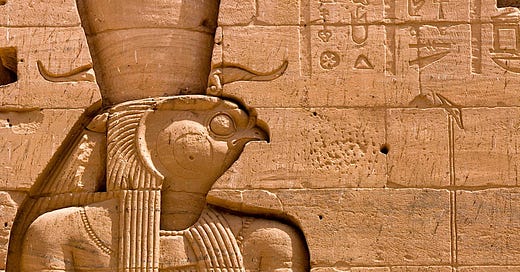What is an Epithet?
Do you ever notice that gods in mythology come with multiple titles? Pallas Athena, Poseidon the Earth-Shaker, Horus of the Horizon, Hathor the Mistress of the Sky, and Odin the Allfather are just a few examples of these titles or epithets. What is an epithet though and why is it important?
The basic definition of epithet is “an adjective or descriptive phrase expressing a quality or characteristic of a person or thing”. In mythology epithets often describe a capacity of a god’s/goddesses’ divinity of domain. Let’s examine the epithets I mentioned earlier.
Palla Athena or the virgin Athena refers to Athena’s status as one of the Greek virgin goddesses—an important part of Athena’s worship in Ancient Greece.
Poseidon the Earth-Shaker refers to Poseidon's role as the god of earthquakes.
Horus of the Horizon represents the interpretation of the Egyptian god as a sun deity. It specifically refers to the dawn or the rising of the sun.
Hathor the Mistress of the Sky refers to Hathor’s worship as a sky and solar goddess.
Odin the Allfather or Father of All refers to Odin’s role as the father of many gods and of man.
Epithets are useful because they point to the aspect of the god being used in a myth. Gods often have wide and varied domains and their personalities and interpretations can often differ depending on what aspect of their domain the myth is focusing on. When you see an epithet it clues you in on what interpretation of the god is being used in the story.
If you see Horus of the Horizon it signifies that not only is Horus being used as not just a sun god but as a fully-fledged deity. Horus has another interesting epithet: Horus the Child, referring to when he was on the run with his mother Isis from Set after the murder of his father Osiris. If you are reading a myth and see Horus referred to with this epithet you know that the myth takes place during his childhood on the run before he defeated Set.
Epithets help give context in mythology. Gods often come with a toolbox full of different domains, characteristics, ages, phases, interpretations, and so on. Epithets are quick and easy ways to let the reader know what aspects or characteristics a narrator is using.



